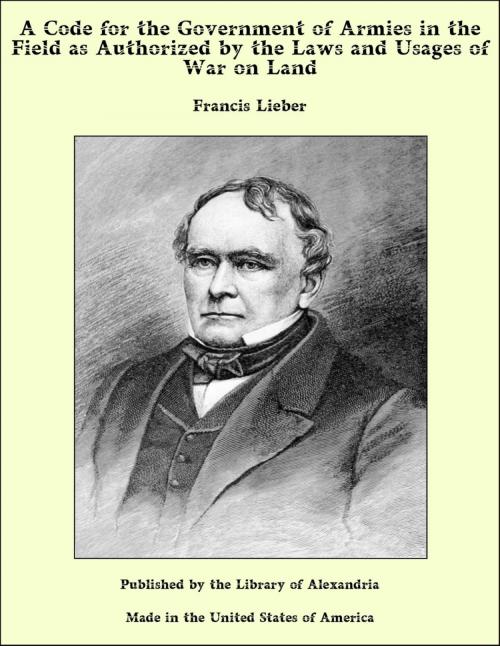A Code for the Government of Armies in the Field as Authorized by the Laws and Usages of War on Land
Nonfiction, Religion & Spirituality, New Age, History, Fiction & Literature| Author: | Francis Lieber | ISBN: | 9781465612267 |
| Publisher: | Library of Alexandria | Publication: | March 8, 2015 |
| Imprint: | Language: | English |
| Author: | Francis Lieber |
| ISBN: | 9781465612267 |
| Publisher: | Library of Alexandria |
| Publication: | March 8, 2015 |
| Imprint: | |
| Language: | English |
§ 1. A place, district, or country, invested or occupied by an enemy, stands, in consequence of the occupation, under the Martial Law of the investing or invading army, whether any proclamation declaring Martial Law, or any public warning to the inhabitants, has been issued or not. Martial Law is the immediate and direct effect and consequence of occupation or conquest. The presence of a hostile army proclaims its Martial Law. § 2. Martial Law does not cease during the hostile occupation, except by special proclamation, ordered by the commander in chief; or by special mention in the treaty of peace, concluding the war, when the occupation of a place or territory continues beyond the conclusion of peace, as one of the conditions of the same. § 3. Martial Law in a hostile country, consists in the suspension, by the occupying military authority, of the criminal and civil law, and of the domestic administration and government in the occupied place or territory, and in the substitution of military rule and force, for the same; as well as in the dictation of general laws—as far as military necessity requires this suspension, substitution, and dictation. It is not unusual to proclaim that the administration of all civil and penal law shall continue, as in times of peace, unless specially interfered with by the military authority. § 4. Martial Law, although called law, does not consist in a body of rules of action. There is not even a distinct term for it in other languages. Martial Law in a conquered or invaded country, or place, is temporary Military Absolutism, in the hands of commanders, who, therefore, must take care that it does not degenerate into arbitrary despotism. Martial Law is not the reckless use of military power by the highest or lowest in arms. Military oppression is not Martial Law. § 5. Military Necessity, as understood by modern civilized nations, consists in the necessity of those measures which are indispensable for the obtaining of the ends of the war, and are lawful according to the modern law and usages of war. § 6. Modern times are distinguished from earlier ages, by the existence, at one and the same time, of many nations and great governments, related to one another in close intercourse. They draw abreast like chariot horses. Peace is their normal condition; war is the exception. The ultimate object of all modern war is a renewed state of peace. The more vigorously wars are pursued, the better it is for humanity. Sharp wars are brief. Ever since the formation and co-existence of modern nations, and ever since wars have become great national wars, War has come to be acknowledged not to be its own end, but the means to obtain great ends of state, or to consist in defence against wrong; and no conventional restriction of the modes adopted to injure the enemy is any longer admitted; but the law of war imposes many limitations and restrictions on principles of justice, faith, and honor.
§ 1. A place, district, or country, invested or occupied by an enemy, stands, in consequence of the occupation, under the Martial Law of the investing or invading army, whether any proclamation declaring Martial Law, or any public warning to the inhabitants, has been issued or not. Martial Law is the immediate and direct effect and consequence of occupation or conquest. The presence of a hostile army proclaims its Martial Law. § 2. Martial Law does not cease during the hostile occupation, except by special proclamation, ordered by the commander in chief; or by special mention in the treaty of peace, concluding the war, when the occupation of a place or territory continues beyond the conclusion of peace, as one of the conditions of the same. § 3. Martial Law in a hostile country, consists in the suspension, by the occupying military authority, of the criminal and civil law, and of the domestic administration and government in the occupied place or territory, and in the substitution of military rule and force, for the same; as well as in the dictation of general laws—as far as military necessity requires this suspension, substitution, and dictation. It is not unusual to proclaim that the administration of all civil and penal law shall continue, as in times of peace, unless specially interfered with by the military authority. § 4. Martial Law, although called law, does not consist in a body of rules of action. There is not even a distinct term for it in other languages. Martial Law in a conquered or invaded country, or place, is temporary Military Absolutism, in the hands of commanders, who, therefore, must take care that it does not degenerate into arbitrary despotism. Martial Law is not the reckless use of military power by the highest or lowest in arms. Military oppression is not Martial Law. § 5. Military Necessity, as understood by modern civilized nations, consists in the necessity of those measures which are indispensable for the obtaining of the ends of the war, and are lawful according to the modern law and usages of war. § 6. Modern times are distinguished from earlier ages, by the existence, at one and the same time, of many nations and great governments, related to one another in close intercourse. They draw abreast like chariot horses. Peace is their normal condition; war is the exception. The ultimate object of all modern war is a renewed state of peace. The more vigorously wars are pursued, the better it is for humanity. Sharp wars are brief. Ever since the formation and co-existence of modern nations, and ever since wars have become great national wars, War has come to be acknowledged not to be its own end, but the means to obtain great ends of state, or to consist in defence against wrong; and no conventional restriction of the modes adopted to injure the enemy is any longer admitted; but the law of war imposes many limitations and restrictions on principles of justice, faith, and honor.















